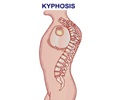New study developed and validated a clinical prediction scale that can be used to conclude which patients are more likely to encounter inadequate pain control following elective spine surgery.

Unfortunately, poor pain control in the days following spine surgery remains common.
The authors of the study conducted a retrospective cohort study of data from 1300 adult patients who were registered in the prospective Canadian Spine Outcomes and Research Network registry between August 28, 2014, and October 4, 2017. These volunteers had undergone elective spine surgery and needed hospitalization for at least 24 hours postoperatively.
The most common complaint was radiculopathy (42%), and the most common disorder was spinal stenosis (39%). The patient's postoperative level of pain was estimated using an 11-point numerical scale. During the first 24 hours after surgery, 57 percent of patients experienced poor pain control.
In the study, patients were randomly allocated to one of two cohort groups: 390 patients to the validation cohort to examine whether the new scoring system fulfilled its purpose and 910 patients to the model development cohort to generate the prediction score for poor postoperative pain control.
Data were analyzed to determine what patient variables are associated with poor pain control.
Advertisement
Source-Medindia












